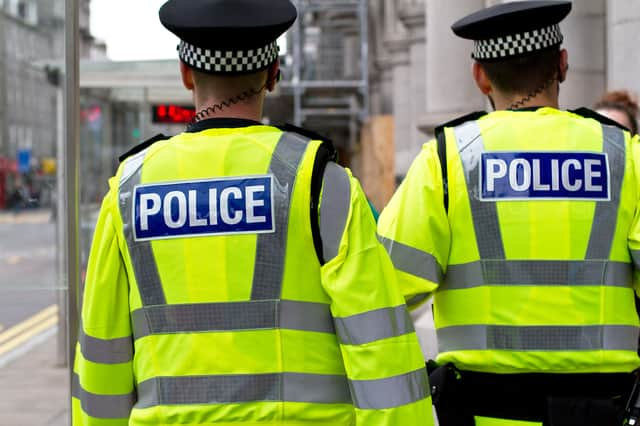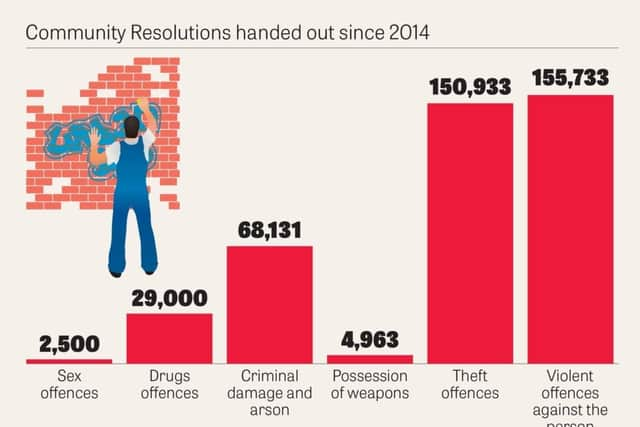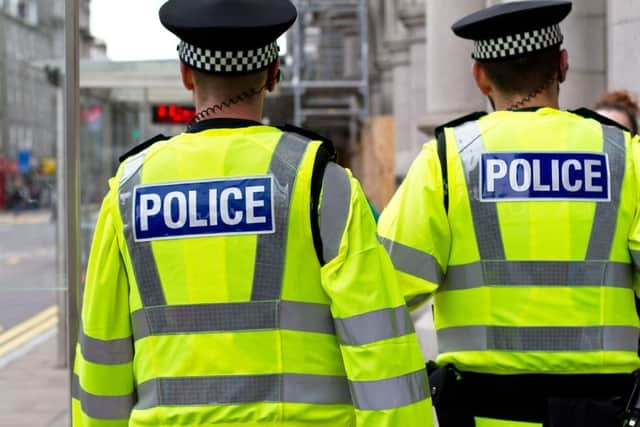Thousands of offenders are getting off with Community Resolutions - here's what you need to know


Thousands of offenders have escaped prosecution through Community Resolution orders, an investigation by the BBC's Shared Data Unit has revealed.
Attempted murder, child exploitation, rape, weapons possession and drug trafficking are just some of the major crimes that have been dealt with through Community Resolutions (CRs) in England and Wales.
Advertisement
Hide AdAdvertisement
Hide AdThe findings have prompted calls for change from politicians, campaigners and experts.


What is a Community Resolution?
A Community Resolution is an out-of-court disposal which does not appear on a criminal record or standard DBS (Disclosure and Barring Service) check. It also doesn't count as a conviction.
Its intended use is for first-time and young offenders and for less serious crimes.
They should also only be given out on an admission of guilt and always with the victim's consent.


Advertisement
Hide AdAdvertisement
Hide AdThere are clear guidelines of when a CR should and shouldn't be given out and it's recommended against using them for domestic abuse involving intimate partners and hate crime.
But hundreds of the most serious crimes have been cleared up with CRs over the years by police forces across England and Wales.
How many Community Resolutions have been handed out?
The BBC's Shared Data Unit looked at more than 15 million crime outcomes from the Home Office recorded between 2014/15 and 2017/18.
The analysis found nearly half a million Community Resolutions have been handed out since 2014, representing 3% of all outcomes of crimes recorded during that period.
Source: BBC Shared Data Unit / Home Office
Advertisement
Hide AdAdvertisement
Hide AdAcross England and Wales at least 500 CRs were issued for indictable-only offences - those so serious they are usually dealt with at crown court - between 2014 and 2018.
Such crimes included rape, drug trafficking, possession of an article with blade or point, possession of firearms, cruelty to children and even attempted murder.
Which police forces have handed out the most?
A CR is just one of several possible outcomes used by police for reported crimes and overall, the analysis found that use of CRs is generally dropping nationally.
CRs made up 4% of all outcomes in 2014/15 and 2% in 2017/18.
Advertisement
Hide AdAdvertisement
Hide AdBut eight forces across England and Wales have seen a rise in their use over that period.
As a percentage of recorded crime outcomes, Durham issued the most at 8% overall, followed by Suffolk (6%), Derbyshire (6%) and North Yorkshire (5%).
British Transport Police and the Metropolitan Police had the lowest percentage of CR outcomes with both totalling just 1%.
Similar outcomes were found in Northern Ireland and Scotland.
Advertisement
Hide AdAdvertisement
Hide AdIn Northern Ireland analysis found a growing percentage of crime outcomes are being recorded as CRs, from 4% in 2015/16 to 4.8% in 2017/18.
They were most commonly used for drugs offences, then theft, criminal damage, violence and weapons possessions.
In Scotland, Recorded Police Warnings (similar to CRs) were issued for more than 40,000 offences between 2015/16 and 2017/18.
These were for less serious crimes like consuming alcohol in a public place, urinating or vandalism.
Little more than a warning for rape
Advertisement
Hide AdAdvertisement
Hide AdChris Henley QC, chairman of the Criminal Bar Association, condemned the use of CRs for serious crimes.
He said: “Community Resolution Orders, which require an admission of guilt, were specifically designed to deal with less serious offences, particularly involving young and/or first time offenders.
500 CRs were issued for indictable only offences between 2014 and 2018. Image: Shutterstock
“What is clear from the figures is that contrary to their original purpose and the very clear guidance given to the police, CROs are being used to deal with more and more serious offences. This shouldn't be happening.
Advertisement
Hide AdAdvertisement
Hide Ad“These cases should be resolved formally in a courtroom. It is incredible that someone who admits committing an offence of rape receives what amounts to little more than a warning.
“It is unsurprising that offenders arrested for serious crime leap at the offer of an informal CRO.
“Sadly, this is all about a lack of resources, that the police and CPS are struggling to cope with the consequences of years of savage cuts.
“The number of CROs issued in serious cases has increased significantly as funding has fallen dramatically. This lets down both the current and future victims of serious crime.”
Not used in the most serious cases
Advertisement
Hide AdAdvertisement
Hide AdNational Police Chiefs' Council Lead for Charging and Out of Court Disposals, Deputy Chief Constable Sara Glen, added: "Our national strategy makes clear community resolutions should not be used in the most serious cases.
"Officers are making decisions about whether it is fair and proportionate to give someone a criminal record for their first minor offence - when they've admitted responsibility, offered to remedy the crime, are considered unlikely to reoffend, and can be given a sanction that deters further offending.
"These figures show that around three per cent of crime is dealt with in this way, and that community resolutions are used in one per cent of sexual offence cases.
"When this occurs each force will scrutinise the decision to ensure that it is appropriate in the circumstances.
Advertisement
Hide AdAdvertisement
Hide Ad"The majority relate to sexual offences between children and young people, which we would classify as peer on peer where we have juveniles who are in relationships but are not yet at the age of consent."
Right thing for the victim
Commenting on the findings Jo Farrell, Chief Constable of Durham Constabulary, said: “We use Community Resolution as an outcome because it is the most appropriate option and, perhaps more importantly, because it works.
“If an incident is correctly recorded as a crime from the start, it means we are able to give the victim the help they deserve and ensure that safeguarding takes place: we can also offer the perpetrator help to address the underlying cause of their offending.
“In many cases, we believe that we can better support the victims and resolve the underlying problems by facilitating a resolution between the parties.
Advertisement
Hide AdAdvertisement
Hide Ad“Before using a Community Resolution, the previous offending behaviour of the offender, the severity of the offence, along with the wishes of the victim, must be considered.
“We recognise that as a force we are a high user of Community Resolution and because of this we use quality assurance methods to ensure that at all times, we have done the right thing for the victim.”